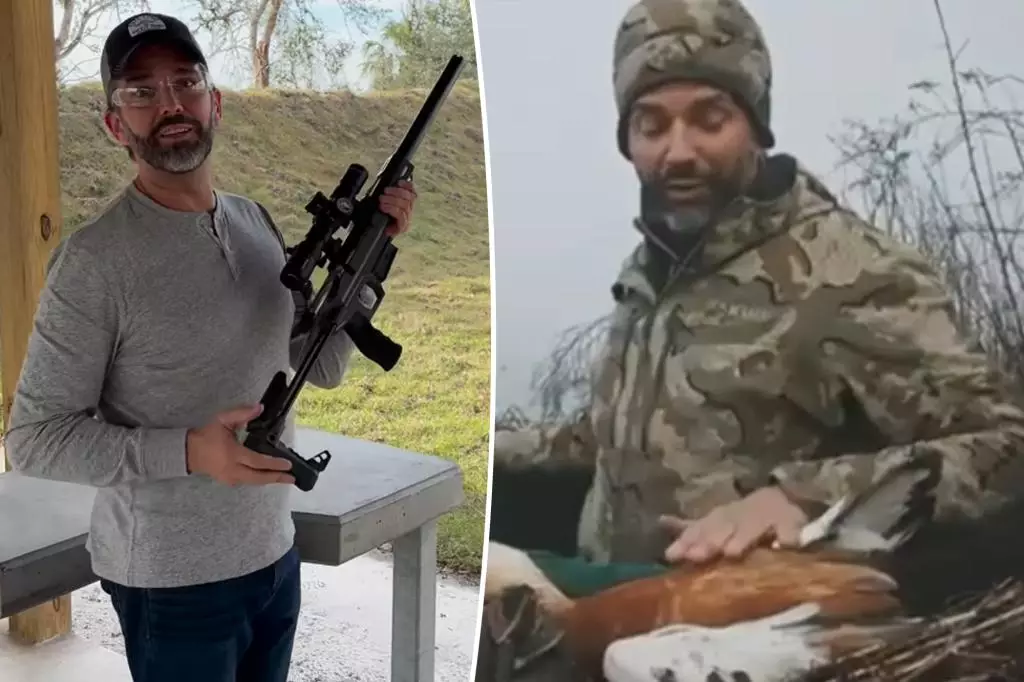In recent years, few figures have stirred as much controversy as Donald Trump Jr. His most recent escapade—a hunting trip in Italy—has drawn ire from animal rights activists and political figures alike. The incident isn’t just about the act of hunting itself, but also highlights the intersection of hunting ethics, environmental conservation, and the contentious politics surrounding celebrity culture.
The backdrop to this controversy involves Donald Trump Jr.’s hunting outing near Venice, where he was filmed shooting ducks—a leisure activity that many people indulge in. However, the situation escalated rapidly when one of the birds allegedly shot was identified as a rare species. Videos and images capturing the hunt were shared, leading to a wave of backlash. Activists accused Don Jr. of not respecting local wildlife and flaunting hunting regulations, emphasizing that it is illegal for non-residents to hunt in Italy without proper licenses.
The identifiable upset among Italian environmentalists was fueled not just by a single rare bird but also by the broader implications of a privileged public figure disregarding local laws. The tumult surrounding the video led to demands for an inquiry into the incident from various political representatives across Italy, magnifying the debate surrounding hunting rights and wildlife conservation.
In the face of mounting criticism, Trump Jr.’s spokesperson, Andy Surabian, staunchly defended him. He stated that Trump Jr. and his hunting party possessed the necessary permits and were abiding by legal hunting practices in an area populated by other hunting groups. This defense attempts to shift the narrative from recklessness to compliance, arguing that any infraction, if it occurred at all, was unintentional.
Surabian highlighted that the main concern seems to stem from the confusion regarding who actually shot the rare duck, suggesting that several hunting groups were present at the time. This points to an underlying issue; when multiple parties engage in hunting activities, determining accountability can often become convoluted.
The assertion that Trump Jr. strictly adheres to hunting regulations illustrates a commitment to ethical hunting practices, albeit one that may be overshadowed by the optics of privilege and the celebrity lifestyle. The spokesperson’s promise of full cooperation with investigations seeks to reinforce this commitment, though skepticism remains regarding the genuine adherence to conservation principles.
Italian politicians quickly seized the opportunity to criticize Donald Trump Jr.’s actions, with figures such as Andrea Zanoni emphasizing that foreign nationals are prohibited from hunting in Italy unless they meet regional residency requirements. This sentiment underscores a national pride in protecting local wildlife and the legal frameworks that govern it.
Calls for prosecution by local MPs and environmental advocates reveal a desire not only for justice in Trump Jr.’s case but also for more rigorous enforcement of hunting laws in general. The legal stipulations surrounding hunting licenses in Italy provoke further discussions about the necessity of international adherence to such laws, especially by high-profile individuals.
While the issue at play primarily involves environmental ethics, it also serves as a stark reminder of the cultural disparities regarding hunting rights—a contentious subject in many countries and one that could potentially provoke dialogue at international levels.
Ultimately, the incident surrounding Donald Trump Jr.’s duck hunt encapsulates much more than celebrity antics; it delves into important discussions about wildlife conservation, licensing regulations, and the consequences of high-profile pursuits of leisure. The scrutiny faced by Trump Jr. raises substantial questions about the responsibilities of public figures towards conservation and adherence to local laws.
This incident could serve as a pivotal moment for discussions about hunting regulations and the ethics surrounding wildlife conservation amidst a growing climate of awareness regarding environmental protection. In a world where the actions of celebrities can galvanize public sentiment and influence policies, it is essential for figures like Trump Jr. to navigate these waters carefully, keeping in mind the collective responsibility humans share towards nature.
As the dust settles on this incident, it remains to be seen whether it will lead to tangible change in hunting practices, increased awareness of local regulations, or simply serve as another chapter in the ongoing saga of celebrity controversies.

